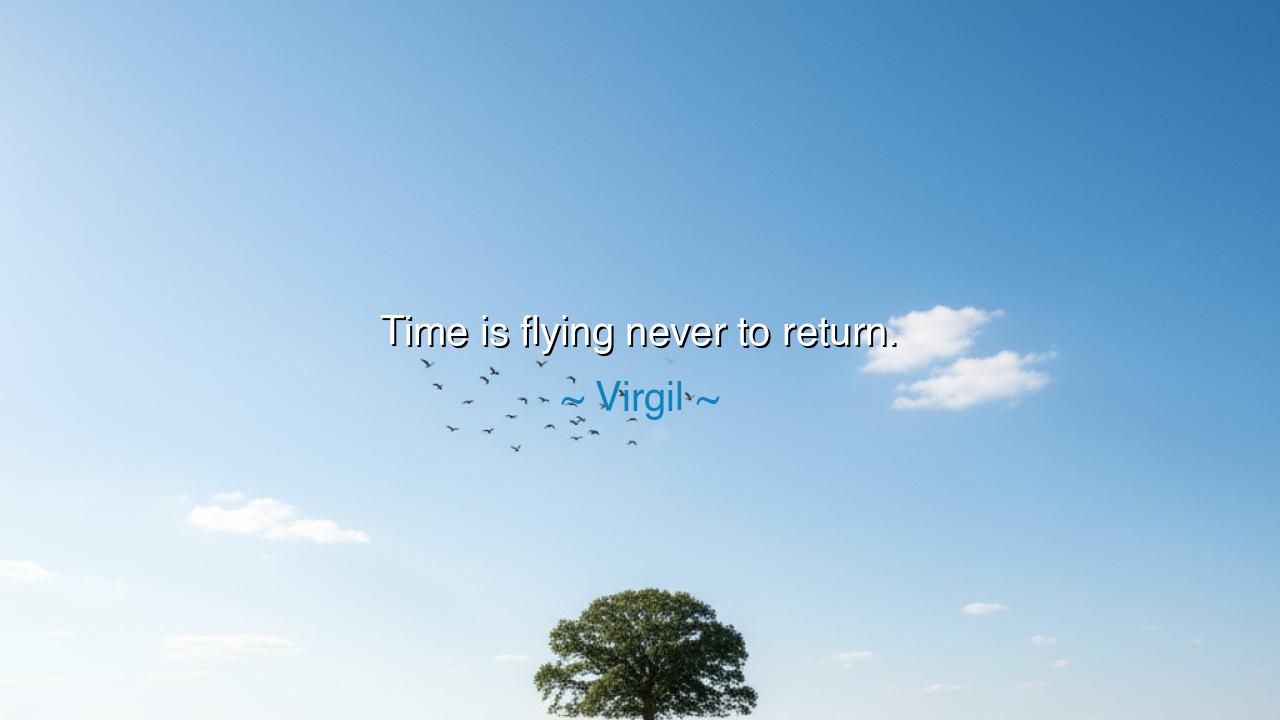
Time is flying never to return.






Hear, O children of tomorrow, the immortal voice of Virgil, who declared with solemn truth: “Time is flying never to return.” These words, though born in the age of Rome, are eternal, for they touch the heart of every man and woman who has felt the swift passage of life. Time is no prisoner of ours; it is a winged messenger, ever moving forward, never circling back. Once an hour has taken flight, it is lost forever, beyond the reach of wealth, power, or tears.
The meaning of this saying is both simple and profound. Virgil reminds us that each moment is a treasure, and yet it slips from our hands like sand through the fingers. We often live as though time were endless, as though tomorrow were guaranteed. But the poet teaches us to awaken, to see that every breath, every heartbeat, is a gift that cannot be reclaimed once spent. To waste it in idleness, in bitterness, or in regret is to betray the sacredness of life.
History proves this wisdom. Recall Alexander the Great, who conquered nations with astonishing speed. At thirty-two, he had achieved what most could not dream of in ten lifetimes. Yet, when fever struck him, all his victories could not purchase another hour. His empire fragmented, but his time, once flown, never returned. His life is a blazing reminder that power cannot hold back the wings of the hours.
And yet, there are also those who honored Virgil’s teaching by using their time wisely. Think of Helen Keller, who, though blind and deaf, carved her life into a monument of courage and wisdom. She did not lament the minutes lost in darkness but seized each moment to learn, to speak, to inspire. Though her days too flew swiftly, she filled them with such substance that her influence still echoes across the ages. She proved that though time cannot return, it can be spent in ways that endure beyond death.
The lesson of Virgil is not one of despair but of urgency. If time flies and never returns, then let us treat each day as sacred. Let us not squander it in endless distraction, nor hoard it in fearful hesitation. Each day is like a coin pressed into our hand. We cannot keep it forever, but we can choose how to spend it. The wise spend their time on deeds of love, learning, and courage. The foolish let it vanish in triviality, lamenting later when the wings have carried it away.
Therefore, my counsel is this: rise early, and greet your hours with reverence. Do not say, “I will love tomorrow,” or “I will begin my work when the season is better,” for tomorrow may never come. Speak your kind words today, for the chance will not return. Begin your great work now, even if only in small steps, for hesitation is the thief of time. Remember always that each day is a river that flows only once; its waters will not pass your way again.
Practical actions stand before you. Keep account of your hours as a merchant keeps account of gold. Reflect each evening: how did I use my day? Was it spent in growth, in service, in beauty? Or was it wasted in shadows? Write, speak, create, love, forgive—these are the ways to transform fleeting hours into eternal memory.
Thus, Virgil’s words stand as a torch across the ages: “Time is flying never to return.” Let them burn in your heart, not as a dirge of despair, but as a summons to live with fire, to fill your days with meaning, to honor the gift of life by using it well. For though the wings of time will carry all away, the deeds of the wise will outlast the flight of the hours and shine forever in the memory of men.






AAdministratorAdministrator
Welcome, honored guests. Please leave a comment, we will respond soon